Akshayakalpa’s journey to understand Cows – Fodder and Feed
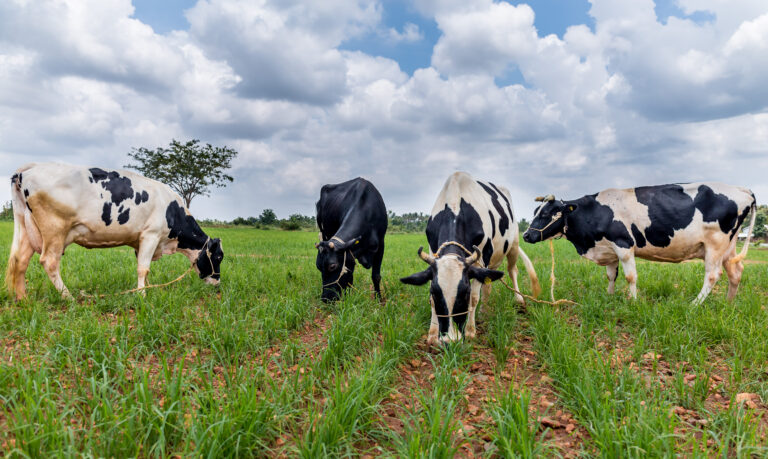
Humans are at the top of the food chain; they consume food and water whenever they feel hungry and thirsty. Owing to this, engineering of the farming systems over the last 10,000 years to suit their needs, and domestication of animals became necessary. One such domesticated being is Cow; revered in our culture and Mythology as Kamadhenu.
The process of domestication of animals and the engineering of farming activities has brought in a lot of practices to suit human convenience. The domestication of animals, especially cows, has not been thought through humanely, which has led to ethical and moral issues in the treatment and feeding of cows.
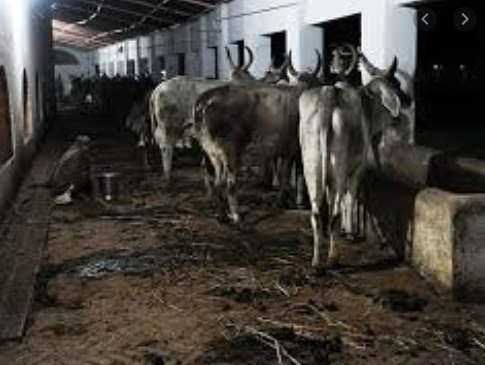
Cows in a conventional dairy setting (Image credits to the respective owner)
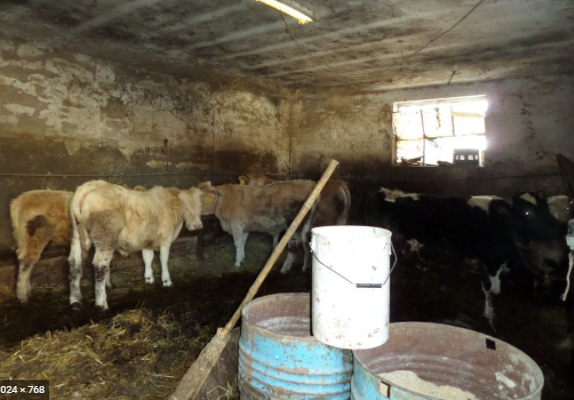
(Image credits to the respective owner)
In a typical dairy farm, cows are tethered perpetually; not given a clean drinking water; not fed as per the dietary requirements; they lie down on their defecation, and cow housing is inadequate.
Let us start our journey by an understanding of the Cow’s diet – What do cows eat?

Cows grazing in Akshayakalpa Farms
About a hundred years back, there were abundant pastures. The cows grazed freely through the day and gave good quality milk after returning to their shelter in the evening. Growing population and industrialization has put tremendous pressure on pasture lands. Dwindling pastures and reduced forest cover have affected the grazing patterns of the cows adversely.
To overcome the shortage of pastures, farmers started feeding agricultural leftovers such as straw and husk to the cows. To balance the lack of nutrition from these foods, they also started feeding industrial feeds. The industrial feed further complicated the matters; it caused stress to the cows as it is not their natural diet. The stress led to cows being susceptible to diseases and a poor quality of milk.
The industrial feeds cannot replace the natural cellulose, which cows convert into energy and protein. Cows need to be raised in a pasture-like environment, with a balanced diet of Dicots, Monocots, and Tree fodders, which in current dairy practices, has been ignored.
Over the past ten years, Akshayakalpa is working to create close to natural feeding systems (most relative to grazing environments) with a balanced diet of monocots, dicots, and Tree Fodders, and continuous access to clean drinking water. At Akshayakalpa, cows are not tied or tethered and are allowed to express natural behaviour.
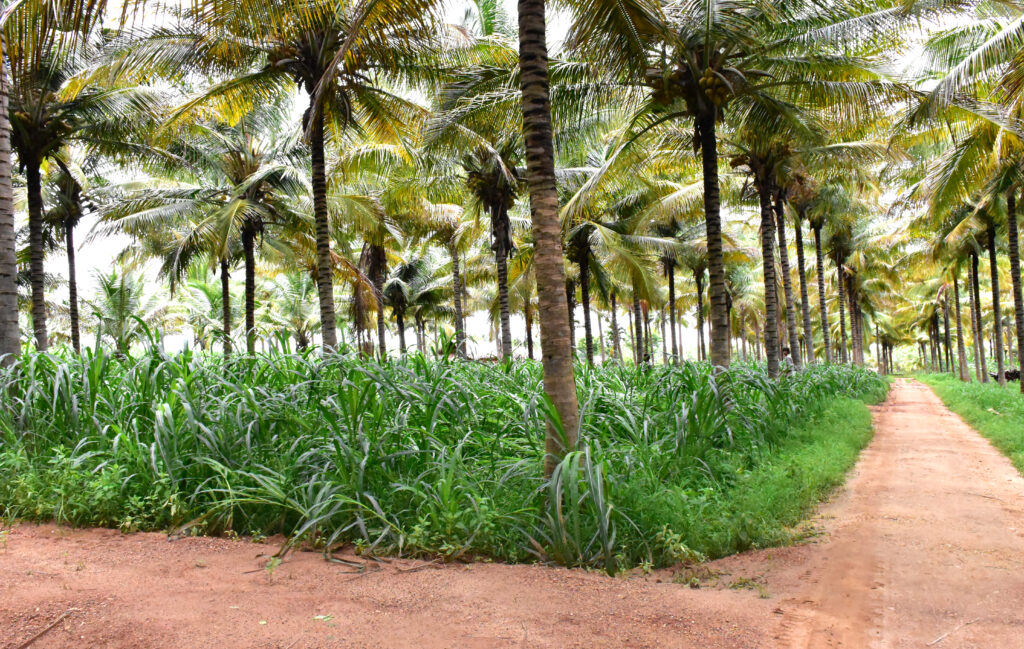
Organic Monocot and Dicot fodder grown at Akshayakalpa farms
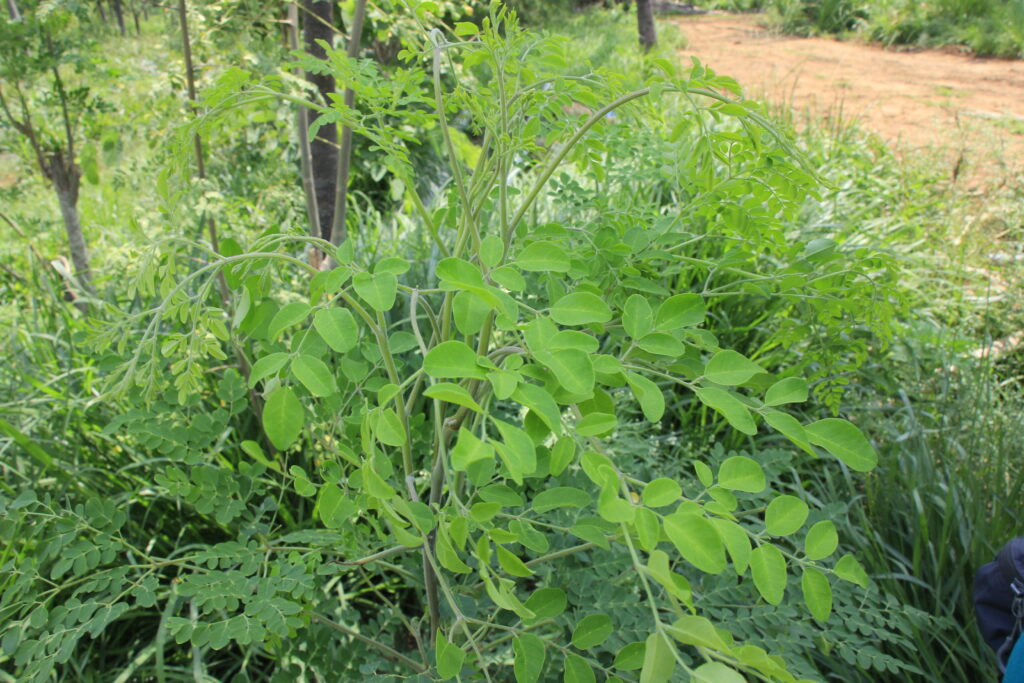
Organic tree-based fodder grown at Akshayakalpa farms
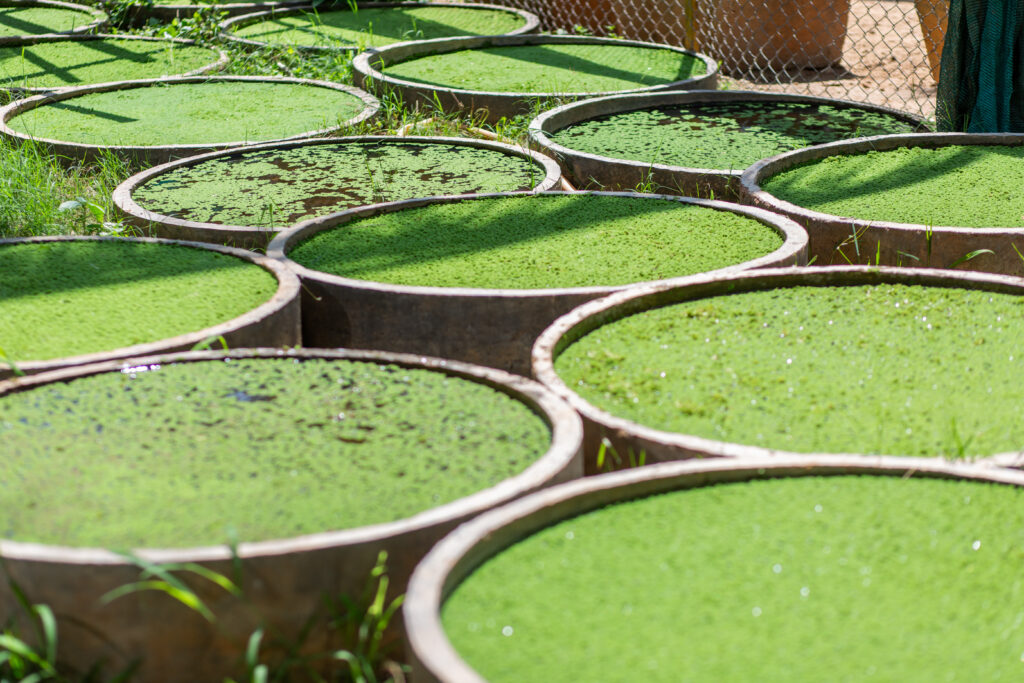
Azolla at our farms
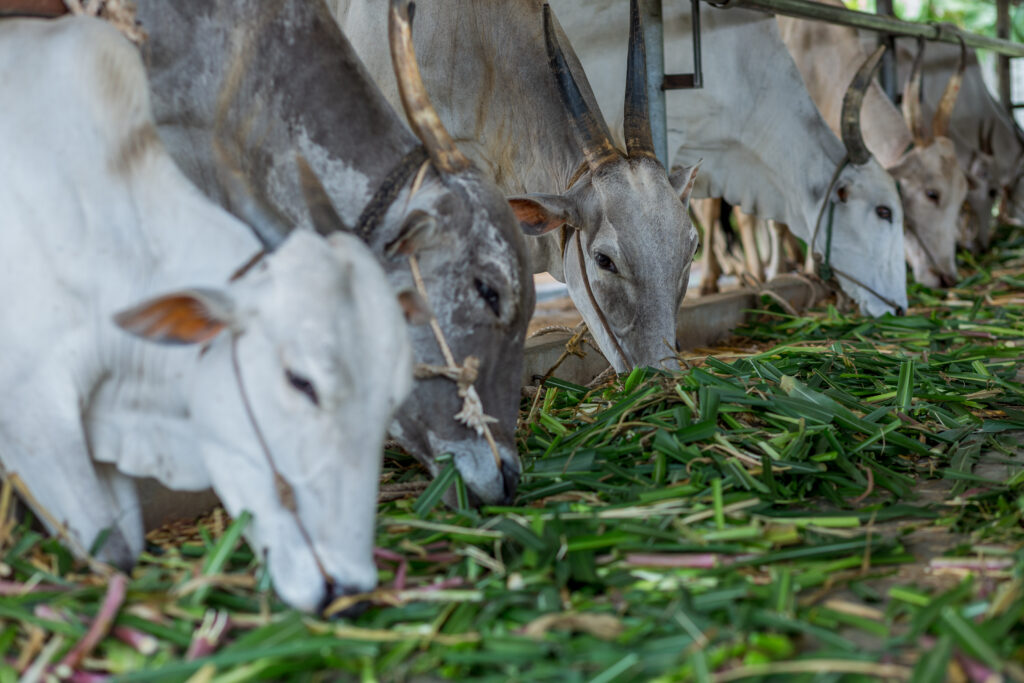
The cows are fed with Organic fodder in well ventilated mangers
The cows at Akshayakalpa farms live in a stress-free environment in a symbiotic relationship with its surroundings and produce probably the best quality milk in the country.
The fodder crops are grown using Organic farming practices. The soil is chemical-free. No use of artificial fertilizers or pesticides is made. And because we practise mixed crop agriculture, the fertility of the earth is naturally maintained.
We understand the diet of Calves, Adult, Milking, and Pregnant Cows. The healthy adult cows, whose age is 15 months and above, eat the Organic fodder that is a balanced mix of Monocots, Dicots, Grass, and Tree-based hay. A healthy adult cow is also given a supplement rich in calcium, magnesium, and phosphorous, once in three days.
Calves have a different diet as their nutritional needs are other than the adults. Up to the first ten days from its birth, the calf is fed only the mother’s milk and clean drinking water. After ten days, the farmers start feeding them porridge made from powdered grains such as ragi and maize along with the mother’s milk. After three months, the calves are weaned off the milk and fed a solid grain diet.
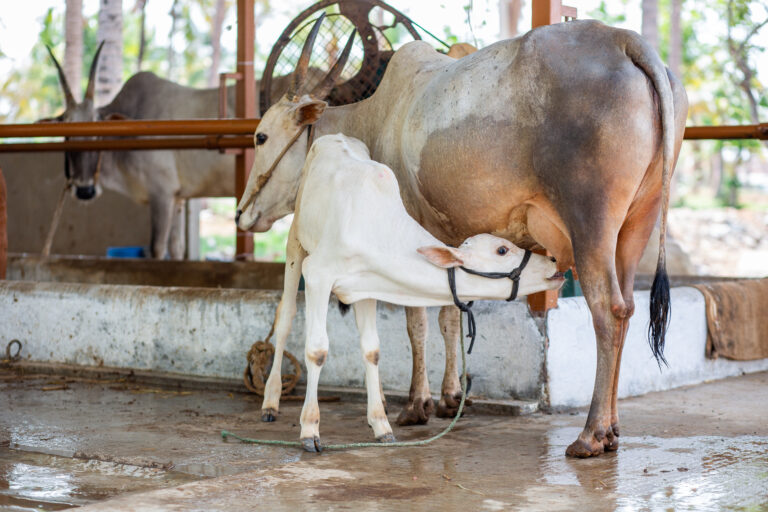
Calves are fed porridge made from Organic Grains like Maize and Ragi along with the mother’s milk for three months
Coming up next – What is a Balanced Diet of Cows?
All Akshayakalpa Organic Milk and Milk Products are available in our App in Bengaluru and Chennai. We ensure a contactless delivery to your doorstep before 7 AM every day.
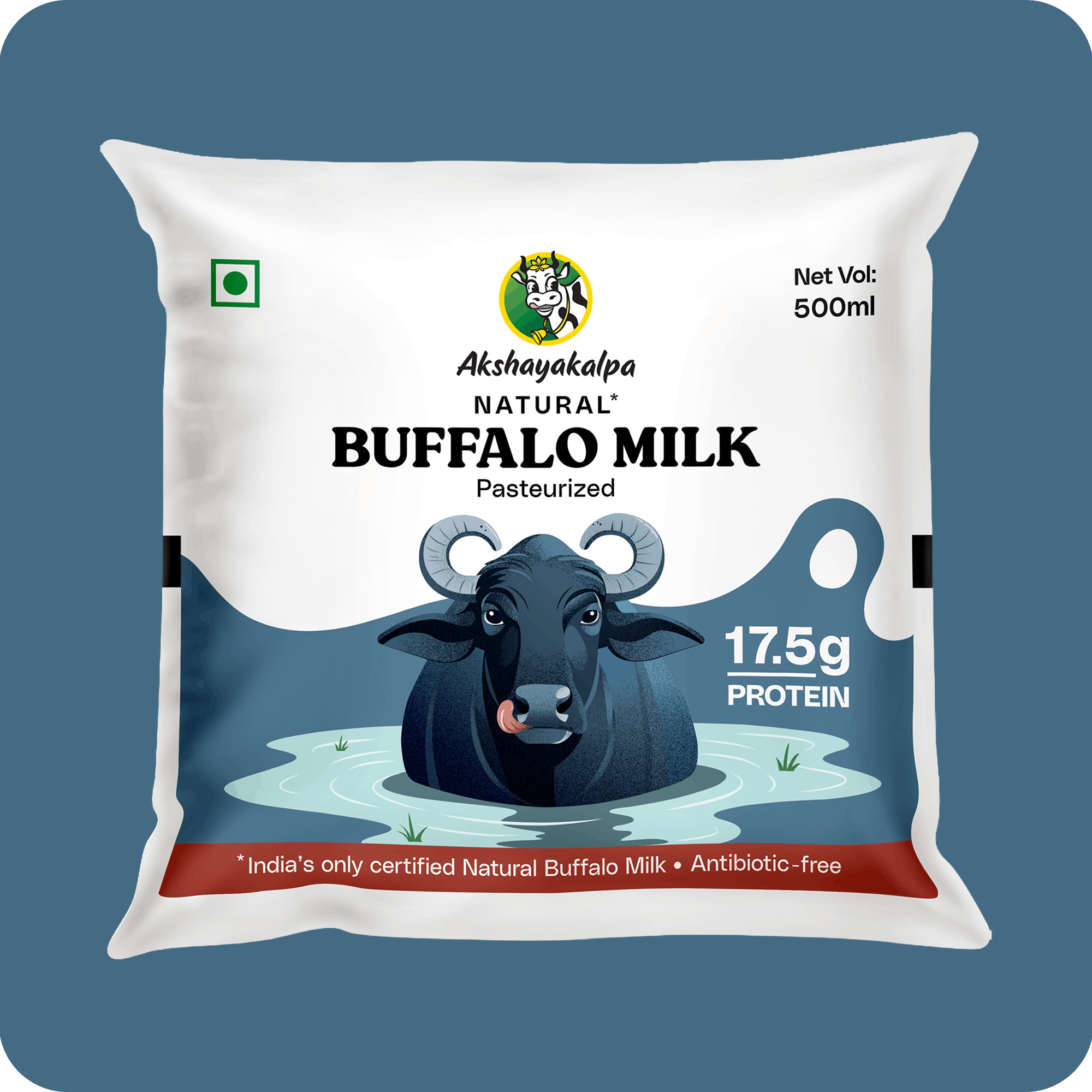
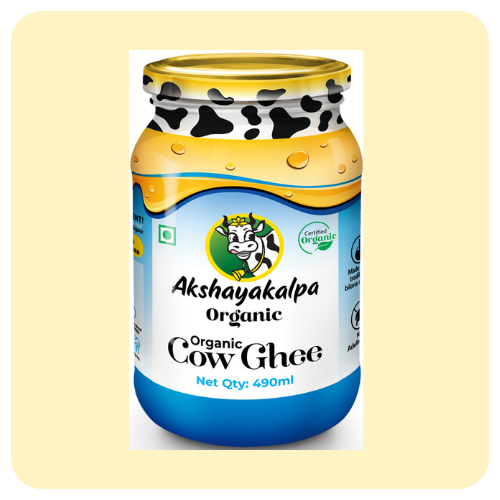
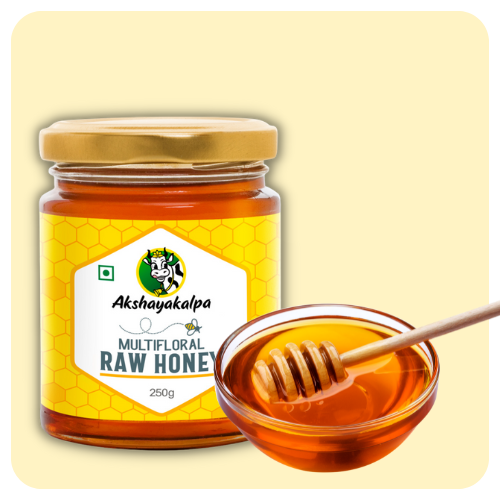
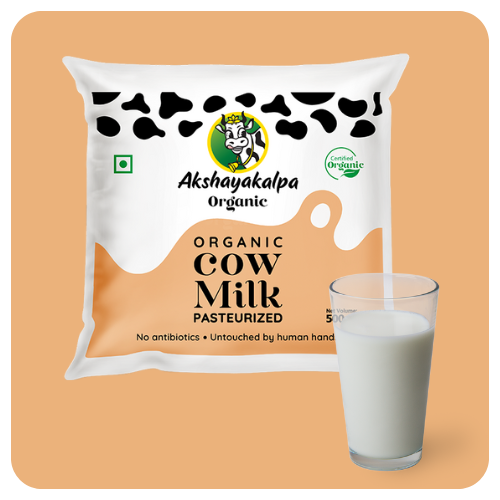
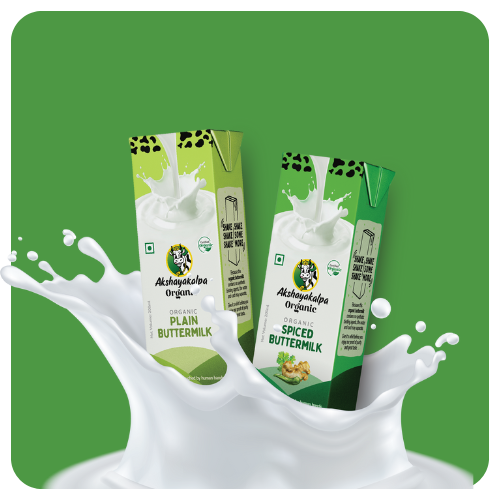
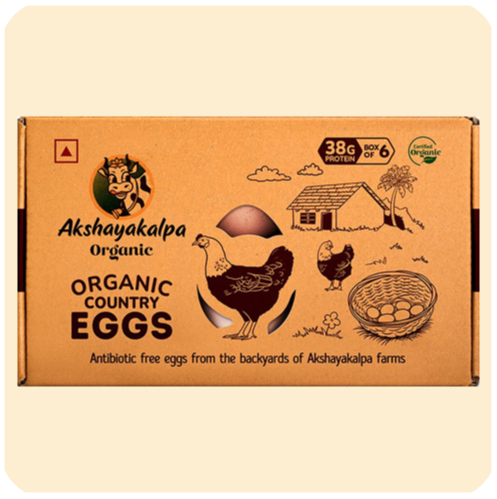
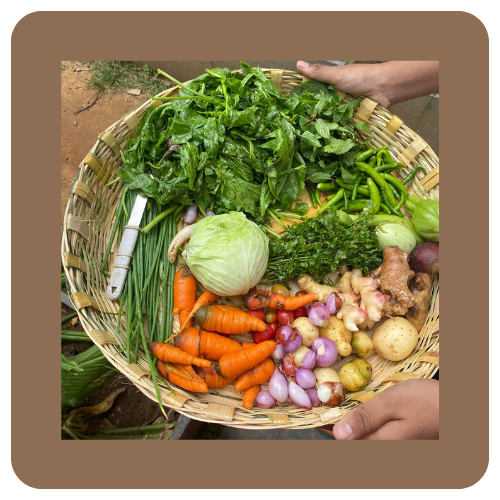

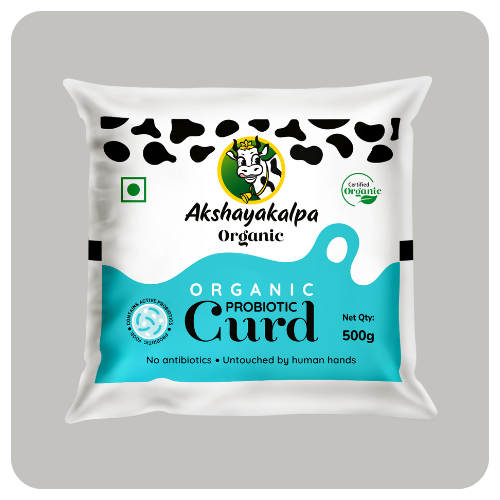
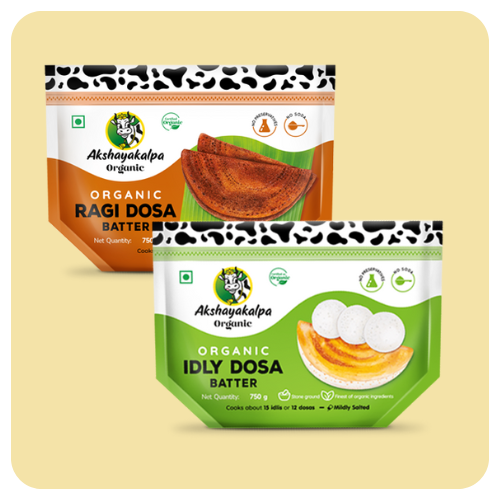
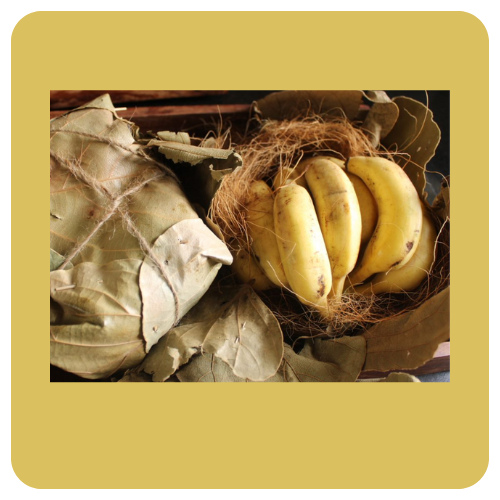
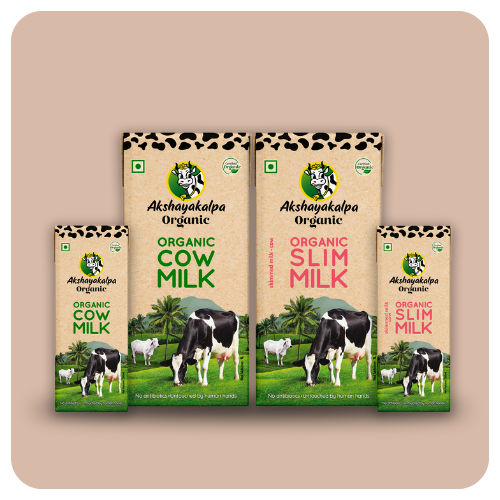
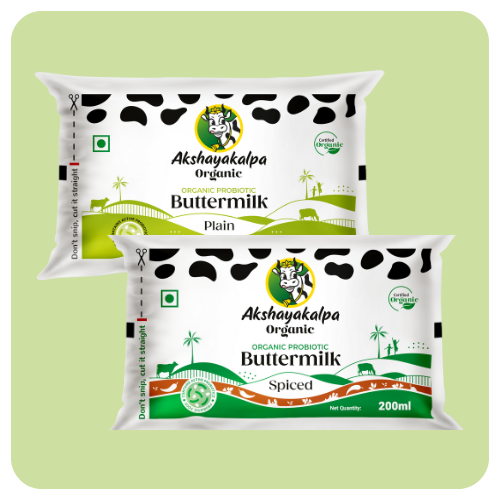
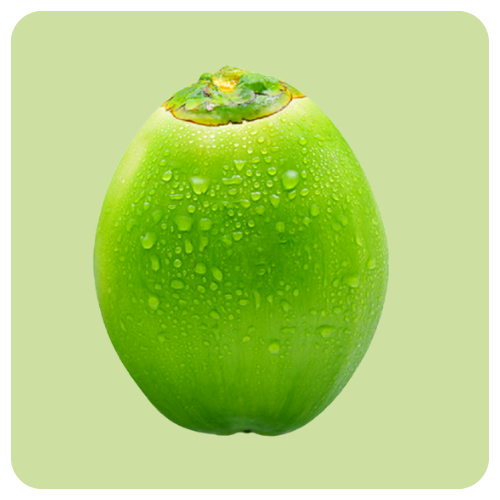
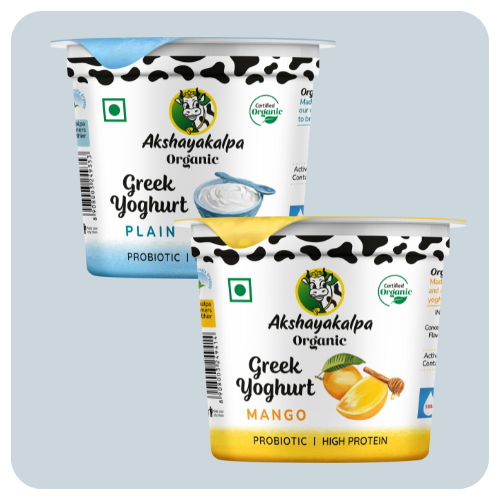
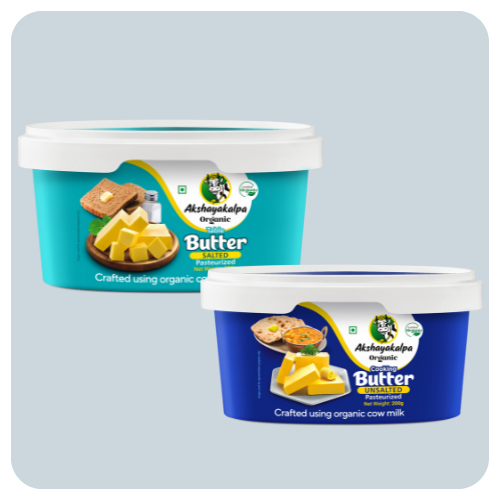
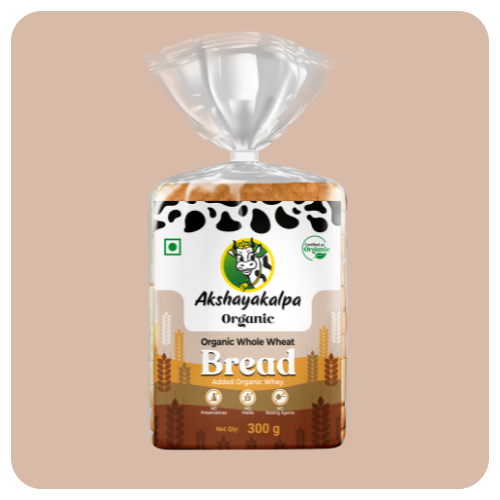
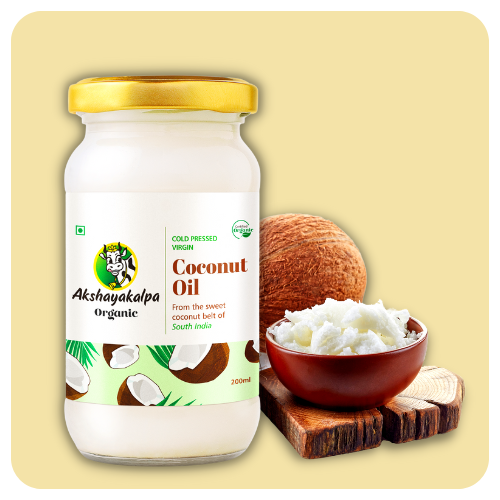



I must thank you for the efforts you have put in penning this site. I am hoping to check out the same high-grade blog posts by you later on as well. In fact, your creative writing abilities has inspired me to get my own, personal blog now 😉
Howdy, i read your blog from time to time and i own a similar one and i was just curious if you get a lot of spam feedback? If so how do you stop it, any plugin or anything you can suggest? I get so much lately it’s driving me mad so any help is very much appreciated.
DreamProxies – Cheapest USA Private Proxies: Elite quality, Unrestricted bandwidth, 1000 mb/s superspeed, 99,9 uptime, Low consecutive IP’s, Number use limitations, Multiple subnets, USA or Europe proxies – Buy Today – DreamProxies.com
I’m often to running a blog and i actually recognize your content. The article has really peaks my interest. I’m going to bookmark your web site and maintain checking for brand new information.
I know this if off topic but I’m looking into starting my own weblog and was curious what all is needed to get set up? I’m assuming having a blog like yours would cost a pretty penny? I’m not very internet smart so I’m not 100 certain. Any suggestions or advice would be greatly appreciated. Thanks
Aw, this was an extremely nice post. Taking the time and actual effort to produce a top notch article… but what can I say… I put things off a whole lot and don’t seem to get nearly anything done.
Aw, this was a really good post. Spending some time and actual effort to create a good article… but what can I say… I put things off a lot and don’t manage to get anything done.
My wife and i were so thankful John managed to round up his investigation through your precious recommendations he obtained through the web site. It is now and again perplexing to simply find yourself freely giving solutions that many some others may have been selling. And now we already know we now have the writer to thank for this. The entire illustrations you have made, the easy blog menu, the relationships you will assist to promote – it’s all sensational, and it’s assisting our son and us do think this issue is entertaining, which is certainly incredibly serious. Thanks for the whole thing!
This is a topic that is near to my heart… Thank you! Exactly where are your contact details though?
naturally like your web-site however you have to take a look at the spelling on several of your posts. Many of them are rife with spelling issues and I to find it very troublesome to inform the reality nevertheless I will definitely come again again.
Wonderful work! This is the type of information that should be shared around the web. Shame on the search engines for not positioning this post higher! Come on over and visit my web site . Thanks =)
Magnificent beat ! I would like to apprentice whilst you amend your site, how could i subscribe for a weblog site? The account aided me a appropriate deal. I were tiny bit familiar of this your broadcast offered bright transparent concept
I simply desired to thank you so much once more. I am not sure the things that I would have implemented in the absence of those strategies shared by you on this topic. It had become a scary condition in my position, nevertheless observing your skilled style you solved that forced me to jump with joy. I will be happy for your information and then hope you are aware of an amazing job that you are providing instructing the others by way of your web blog. I am sure you’ve never encountered all of us.
I used to be recommended this web site by way of my cousin. I am not certain whether or not this publish is written through him as no one else recognise such detailed about my difficulty. You’re amazing! Thank you!
I like what you guys are up too. This sort of clever work and exposure! Keep up the amazing works guys I’ve you guys to my own blogroll.
Great site you have here.. It’s hard to find good quality writing like yours these days. I honestly appreciate people like you! Take care!!
Well I definitely liked studying it. This article offered by you is very constructive for accurate planning.
I like the valuable information you supply on your articles. I抣l bookmark your blog and take a look at once more here frequently. I’m quite certain I抣l learn lots of new stuff proper right here! Good luck for the following!
I believe that is among the so much vital information for me. And i am glad studying your article. However wanna commentary on some common things, The site style is wonderful, the articles is in point of fact great : D. Just right activity, cheers
great issues altogether, you just won a new reader. What could you recommend about your put up that you just made some days in the past? Any positive?
Top ,.. top top … post! Keep the good work on !
I really liked your blog.Really looking take up to retrieve more. Fantastic.
Superb blog! Do you have any tips for aspiring writers? I’m planning to start my own website soon but I’m a little lost on everything. Would you recommend starting with a free platform like WordPress or go for a paid option? There are so many options out there that I’m completely overwhelmed .. Any suggestions? Kudos!
Fantastic blog article.Much thanks again. Will read on…
I truly appreciate this blog post.Really looking forward to read more. Want more.
Your style is very unique in comparison to other folks I have read stuff from. Many thanks for posting when you have the opportunity, Guess I will just bookmark this site.
Thank you ever so for you post.Really thank you! Really Cool.
There’s definately a great deal to know about this issue. I really like all the points you have made.
It’s hard to find well-informed people on this subject, however, you seem like you know what you’re talking about! Thanks
Very good blog article.Much thanks again.
Howdy! This blog post could not be written any better! Going through this article reminds me of my previous roommate! He constantly kept preaching about this. I am going to forward this information to him. Fairly certain he will have a good read. Thank you for sharing!
You ought to take part in a contest for one of the best sites on the web. I am going to highly recommend this web site!
I really enjoy the blog.Thanks Again. Keep writing.
A round of applause for your article post.Really looking forward to read more. Cool.
I blog quite often and I really thank you for your information. This great article has really peaked my interest. I am going to bookmark your blog and keep checking for new information about once per week. I subscribed to your Feed as well.
Great, thanks for sharing this post.Really thank you! Much obliged.
This blog was… how do I say it? Relevant!! Finally I have found something that helped me. Thank you!
I believe this web site has some real good information for everyone : D.
Having read this I believed it was very enlightening. I appreciate you taking the time and effort to put this information together. I once again find myself personally spending way too much time both reading and commenting. But so what, it was still worth it!
Thanks a lot for the blog.Really looking forward to read more. Keep writing.
Very nice blog post. I certainly appreciate this website. Keep writing!
I was able to find good advice from your blog articles.
Very good post.Much thanks again. Great.
Great article! We will be linking to this great content on our site. Keep up the good writing.
I am so grateful for your post.Thanks Again. Really Great.
I loved your blog post.
After looking over a handful of the blog articles on your site, I honestly appreciate your technique of blogging. I saved as a favorite it to my bookmark website list and will be checking back in the near future. Please visit my website as well and tell me your opinion.
Great, thanks for sharing this article.Really thank you! Cool.
Appreciate you sharing, great post.Much thanks again. Really Cool.
Im thankful for the article post.Really thank you! Will read on…
WONDERFUL Post.thanks for share..extra wait .. ?
Enjoyed every bit of your blog.Thanks Again. Great.
Great, thanks for sharing this blog post.Really looking forward to read more. Cool.
I have been exploring for a little bit for any high quality articles or blog posts on this kind of area . Exploring in Yahoo I at last stumbled upon this website. Reading this info So i抦 happy to convey that I’ve a very good uncanny feeling I discovered just what I needed. I most certainly will make sure to do not forget this website and give it a look regularly.
Really enjoyed this blog article.Much thanks again. Really Cool.
An interesting discussion is definitely worth comment. I believe that you should write more about this issue, it might not be a taboo matter but typically people do not speak about such issues. To the next! Kind regards.
I really like and appreciate your blog article. Really Great.
Hey, thanks for the blog post.Really thank you! Great.
Thanks-a-mundo for the article. Cool.
Great, thanks for sharing this blog post.Really looking forward to read more. Want more.
Muchos Gracias for your post.Really looking forward to read more. Keep writing.
I really enjoy the blog article.Thanks Again. Really Great.
Hi, I do believe this is a great web site. I stumbledupon it 😉 I am going to come back once again since i have bookmarked it. Money and freedom is the greatest way to change, may you be rich and continue to guide others.
I really enjoy the article.Thanks Again. Keep writing.
Wow, great blog post.Really thank you! Great.
Fantastic blog.Really thank you! Much obliged.
Really appreciate you sharing this blog article.
Howdy! I could have sworn I’ve visited your blog before but after browsing through a few of the articles I realized it’s new to me. Nonetheless, I’m definitely happy I stumbled upon it and I’ll be book-marking it and checking back often!
Thanks a lot for the post.Thanks Again. Fantastic.
I appreciate you sharing this article.Really thank you! Great.
Im grateful for the post.Really thank you! Cool.
Enjoyed every bit of your blog.Much thanks again.
I love it when individuals get together and share views. Great website, continue the good work.
fantastic issues altogether, you simply received a brand new reader. What would you recommend in regards to your submit that you simply made a few days ago? Any positive?
Im grateful for the blog post.Really thank you! Awesome.
I am so grateful for your post.Much thanks again. Want more.
Hey, thanks for the blog post. Really Cool.
Im thankful for the blog article. Keep writing.
Awesome article post.Thanks Again.
You have made some really good points there. I looked on the net for more info about the issue and found most individuals will go along with your views on this website.
Really appreciate you sharing this post.Really looking forward to read more. Awesome.
Really enjoyed this blog article.Thanks Again. Great.
I really like and appreciate your blog.Thanks Again. Great.
Very nice article. I definitely appreciate this website. Thanks!
Thanks again for the article.Thanks Again. Great.
Im grateful for the article.Really looking forward to read more. Cool.
A round of applause for your blog. Want more.
Really informative post.Much thanks again.
I truly appreciate this article post.Really thank you! Keep writing.
Im obliged for the blog post.Really thank you! Much obliged.
Im obliged for the article post.Much thanks again. Much obliged.
Major thankies for the blog.Much thanks again. Great.
A round of applause for your article. Want more.
Thanks a lot for the post.Thanks Again. Really Great.
Very good blog post.Really thank you! Much obliged.
Thanks a lot for the blog article.Thanks Again. Really Cool.
A round of applause for your blog. Really Cool.
wow, awesome blog post. Will read on…
Thank you ever so for you article post.Really thank you! Much obliged.
Drug information leaflet. Effects of Drug Abuse.
how to buy generic accutane in the USA
All what you want to know about meds. Read information here.
Awesome post.Much thanks again. Cool.
I appreciate you sharing this article post.Really looking forward to read more. Keep writing.
I appreciate you sharing this blog post.Much thanks again. Want more.
I’m excited to find this great site. I wanted to thank you for ones time just for this wonderful read!! I definitely really liked every part of it and i also have you bookmarked to check out new information on your site.
Muchos Gracias for your post.Really thank you! Much obliged.
I found your weblog site on google and test a few of your early posts. Continue to maintain up the excellent operate. I just additional up your RSS feed to my MSN Information Reader. Seeking ahead to reading extra from you later on!?
Thanks for your tips. One thing I’ve got noticed is banks in addition to financial institutions have in mind the spending patterns of consumers and understand that plenty of people max out there their cards around the vacations. They prudently take advantage of this specific fact and begin flooding your current inbox and snail-mail box having hundreds of no interest APR card offers shortly after the holiday season ends. Knowing that if you are like 98 of American open public, you’ll hop at the one opportunity to consolidate consumer credit card debt and switch balances towards 0 annual percentage rates credit cards.
Looking forward to reading more. Great post.Really looking forward to read more.
I’m amazed, I have to admit. Rarely do I encounter a blog that’s both educative and interesting, and let me tell you, you’ve hit the nail on the head. The issue is something which not enough folks are speaking intelligently about. Now i’m very happy I stumbled across this in my search for something relating to this.
Saved as a favorite, I really like your web site.
I’ve learned a number of important things by means of your post. I would also like to convey that there may be situation where you will have a loan and do not need a cosigner such as a Fed Student Aid Loan. However, if you are getting a borrowing arrangement through a regular financial institution then you need to be ready to have a cosigner ready to allow you to. The lenders will certainly base that decision on the few aspects but the main one will be your credit rating. There are some loan providers that will furthermore look at your work history and determine based on this but in many instances it will depend on your credit score.
When I read an article on this topic, casinosite the first thought was profound and difficult, and I wondered if others could understand.. My site has a discussion board for articles and photos similar to this topic. Could you please visit me when you have time to discuss this topic?
Wow, great article.Much thanks again. Will read on…
Hello! I could have sworn Iíve been to this blog before but after going through a few of the posts I realized itís new to me. Anyhow, Iím certainly happy I came across it and Iíll be book-marking it and checking back frequently!
I needed to thank you for this excellent read!! I certainly loved every bit of it. I’ve got you book-marked to check out new stuff you postÖ
When I initially left a comment I appear to have clicked the -Notify me when new comments are added- checkbox and from now on every time a comment is added I recieve 4 emails with the exact same comment. There has to be a way you can remove me from that service? Thank you!
Really informative blog article.Thanks Again. Cool.
When I initially commented I appear to have clicked on the -Notify me when new comments are added- checkbox and now every time a comment is added I receive 4 emails with the exact same comment. Perhaps there is a way you are able to remove me from that service? Thank you!
Really enjoyed this blog.Much thanks again. Will read on…
Really appreciate you sharing this blog.Much thanks again. Will read on…
Iím impressed, I must say. Seldom do I encounter a blog thatís equally educative and amusing, and without a doubt, you’ve hit the nail on the head. The issue is an issue that too few men and women are speaking intelligently about. I’m very happy I came across this during my hunt for something concerning this.
After looking into a handful of the articles on your web site, I truly appreciate your way of writing a blog. I added it to my bookmark website list and will be checking back in the near future. Please visit my website as well and let me know how you feel.
Iím amazed, I have to admit. Seldom do I come across a blog thatís both educative and entertaining, and let me tell you, you have hit the nail on the head. The problem is an issue that not enough men and women are speaking intelligently about. I’m very happy that I found this during my hunt for something relating to this.
Let me just get straight to the point; I saw your blog and I think you would be a great fit for our company :-). We are currently paying upwards of $70/hour for English translators. We are looking for people who are reliable, hardworking, and willing to work long-term. English fluency is preferred, and I don’t think you should have any problems with this requirement. We are an online based company from North Carolina. Interested? Apply here: https://msha.ke/freedomwithtay
Saved as a favorite, I love your blog!
After looking into a few of the blog articles on your blog, I truly like your way of blogging. I added it to my bookmark webpage list and will be checking back in the near future. Please visit my web site as well and tell me your opinion.
Iím impressed, I have to admit. Seldom do I encounter a blog thatís both educative and interesting, and let me tell you, you have hit the nail on the head. The problem is an issue that not enough folks are speaking intelligently about. Now i’m very happy I found this in my search for something regarding this.
bookmarked!!, I really like your site!
Fantastic blog.Really looking forward to read more. Fantastic.
I loved your blog article.Much thanks again. Fantastic.
An impressive share! I have just forwarded this onto a co-worker who was conducting a little homework on this. And he in fact ordered me dinner due to the fact that I discovered it for him… lol. So allow me to reword this…. Thank YOU for the meal!! But yeah, thanks for spending the time to discuss this matter here on your blog.
Fantastic blog.Really looking forward to read more.
Thanks a lot for the article.Really looking forward to read more. Cool.
I really enjoy the blog article.Really thank you! Really Great.
Valuable info. Fortunate me I discovered your site by
accident, and I am surprised why this twist of
fate did not happened in advance! I bookmarked it.
Also visit my website tracfone special coupon 2022
Fantastic blog article.Much thanks again. Really Great.
I cannot thank you enough for the article.Really thank you! Awesome.
I value the blog.Much thanks again. Really Great.
Very neat blog post. Really Cool.